Howard Andrew Jones's Blog, page 49
January 23, 2015
Lord Dunsany Re-Read: Time and the Gods, Part 5
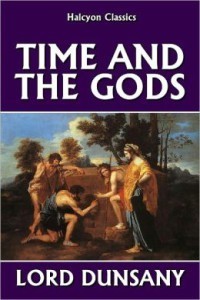 Bill Ward and I are continuing our Lord Dunsany re-read with the next two stories published in the original Time and the Gods (not the omnibus). You can find a free copy of the book here and join in the discussion. Our rating system is pretty simple. One star is a standout, and two stars is truly notable. Most of Lord Dunsany’s fantasy work is already fairly remarkable, so even a “no star” story on this scale may be worth a look. This week we read “The Men of Yarnith” and “For the Honour of the Gods.”
Bill Ward and I are continuing our Lord Dunsany re-read with the next two stories published in the original Time and the Gods (not the omnibus). You can find a free copy of the book here and join in the discussion. Our rating system is pretty simple. One star is a standout, and two stars is truly notable. Most of Lord Dunsany’s fantasy work is already fairly remarkable, so even a “no star” story on this scale may be worth a look. This week we read “The Men of Yarnith” and “For the Honour of the Gods.”
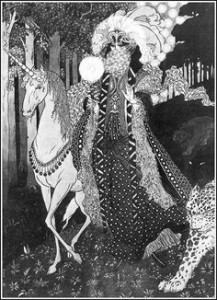
More Lord Dunsany inspired art by Sidney Sime.
Howard: Of the two I was most taken with “The Men of Yarnith,” even if it felt a little disjointed. Lord Dunsany returned again to his depiction of famine as a creature, although I think I liked its presentation better in one of the earlier stories. Through the first part it seems that the gods are real. I especially enjoyed the depiction of the seasons as entities that chase one another. By the second half, we readers realize we have been reading myths of the men of Yarnith, else we’d not receive the ending, where it’s discovered that the God is merely a stone figure, and the men renounce the gods and take responsibility for their own actions, and consequently their own salvation. Although this story held many fine passages, I don’t think I liked it as well as number of others.
As to “For the Honour of the Gods,” I think I like the idea better than the execution. Perhaps I’m growing tired of the theme. Here’s a land without religion, witness to lands destroyed by religion, and though they try to get by without the gods, they’re destroyed by them when they take it up. I’m an atheist myself so I’m in sympathy with the position but I don’t need to hear the same song every time I come to the juke box. If I pretend that I read it on my own apart from the other entries, I still don’t like it as well as Lord Dunsany at his best, though it’s still worth a read. I award “The Men of Yarnith” a star, and no star for “Honour.” What’s your take?
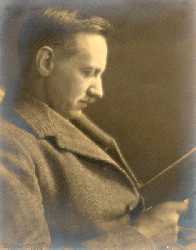
Lord Dunsany
Bill: My impressions mirror your own, Howard, with one star to “Yarnith” as well. I may also be getting a bit of religion or anti-religion fatigue (but it is titled Time and the Gods after all!). I think part of the reason is because, paradoxically, we are only reading a few stories a week. I tend to look forward to them, hoping for something like “The Coming of the Sea,” “A Legend of the Dawn,” or “The Cave of Kai” each time. So the lesser stories, or the ones that are more repetitive, stick out a lot more when that’s all I’ve read for the week, when normally I would have moved past them more quickly. Possibly also the need to *say* something about each one makes them feel more repetitious as well. However, as we are always at pains to point out, even lesser Dunsany is some potent stuff, and I suspect if I’d read either of this week’s stories in isolation and not part of our series I would have been much more enthusiastic. That’s the problem with comparing Dunsany to Dunsany, he sets the bar really high for himself.
Both stories suggest mankind is better off without religion. “Yarnith” does so by showing what taking responsibility for success and putting it in human hands can do, and “Honour” by showing the pointless strife of religion. So, a positive inducement, and a negative warning — I would not be at all surprised to learn that these stories were written back to back. “Yarnith” is much more interesting on every level than “Honour,” in many ways it seems a reprise of “The Vengeance of Men,” with a happier ending. A shame those men of Arim didn’t live further away from the gods, since the men of Yarnith are doing just fine now, though wisely they keep on praying just the same. It also reminded me of “The Sword and the Idol” from A Dreamer’s Tales, which could almost be a spiritual sequel in a way — what happens when men finally see the strings of the puppet.
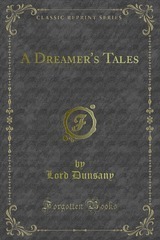 As for the description of famine, I really liked the image, with the farmers throwing water on famine’s “dry grey fur,” and then famine returning just as soon as it had dried out again. That evokes images of parched landscapes and leeched-out soil. The extended metaphor of Yarni Zai clothed in rock is also some great stuff, and I think it sets up the revelation of the discovery of tool-marks in his face very well.
As for the description of famine, I really liked the image, with the farmers throwing water on famine’s “dry grey fur,” and then famine returning just as soon as it had dried out again. That evokes images of parched landscapes and leeched-out soil. The extended metaphor of Yarni Zai clothed in rock is also some great stuff, and I think it sets up the revelation of the discovery of tool-marks in his face very well.
I do wonder if the shift we have already seen from the early stories with the gods right up front and visible and active, to these stories where the gods are clearly images in the minds of men will continue.
Howard: I ought to know the answer, seeing as this is the third time I’ve read this collection, but I don’t recall what happens next. I guess we’ll find out together! Next week we’ll be reading “Night and Morning” and “Usury.” Hope to see you here.
January 22, 2015
Robert E. Howard’s Birthday
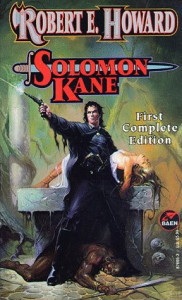 Here’s to Robert E. Howard, creator of my favorite genre, sword-and-sorcery, on the anniversary of his birth. Raise high your goblets and drink deep.
Here’s to Robert E. Howard, creator of my favorite genre, sword-and-sorcery, on the anniversary of his birth. Raise high your goblets and drink deep.
What is best about Robert E. Howard’s writing? The driving headlong pace, the seemingly inexhaustible imagination, the splendid cinematic prose poetry, the never-say-die protagonists? It is hard to pick one thing, so it may be simpler to state that Robert E. Howard possessed profound and often astonishing storytelling gifts. Without drowning his readers in adjectives (he had the knack of using just enough adjectives or adverbs, and knew to let the verbs do the heavy lifting) or slowing pace, he brought his scenes to life. Vividly.
Writer Eric Knight may have most succinctly described this particular aspect of Howard’s power in an article on Solomon Kane:
“’Wings of the Night’ features a marathon running fight through ruin, countryside, and even air that only a team of computer animators with a sixty-million dollar budget and the latest rendering technology (or a single Texan from Cross Plains hammering the story out with worn typewriter ribbon) could bring properly to life.”
Howard was only 30 when he died in 1936, meaning the bulk of his best prose — and there was a lot of it — was created when he was between 25 and 30 years of age, which makes his achievements that much more astonishing. Bram Stoker, Ian Fleming, and Arthur Conan Doyle created characters who are now rooted firmly in our popular imagination. Edgar Rice Burroughs did the same with Tarzan, and anyone who digs even a little further into his work knows John Carter is an also ran. Howard’s Conan, too, has achieved popular recognition, but there is much more to Howard than the dull barbarian depicted in the movies, one which bears but passing resemblance to the character from the stories. There was King Kull, and Solomon Kane, and Bran Mak Morn, and El Borak, and more obscure characters like James Allison, Steve Costigan, and one of my personal favorites, Turlogh Dubh O’Brien. The deeper you dig into Howard’s canon, the more treasures you find. Some of my most favorite stories are his historicals, never as popular among readers perhaps because there are so few serial characters among them, or perhaps because there are few fantastic elements within. The action and pace and all else is there, along with some of his very finest prose and plotting.
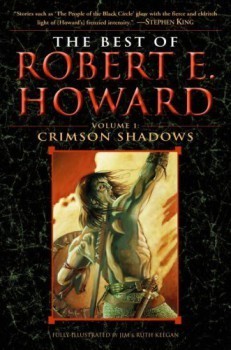 I didn’t really discover Howard until nearly 20 years ago, when I decided that if I was serious about writing fantasy I needed to explore its roots and understand where it came from. Oh, I’d seen Conan on the bookshelves and on comic book covers, but the endless rows of pastiche Conan and the fellow who was frequently running around in a loincloth on those covers didn’t much interest me. I incorrectly assumed it was all rubbish.
I didn’t really discover Howard until nearly 20 years ago, when I decided that if I was serious about writing fantasy I needed to explore its roots and understand where it came from. Oh, I’d seen Conan on the bookshelves and on comic book covers, but the endless rows of pastiche Conan and the fellow who was frequently running around in a loincloth on those covers didn’t much interest me. I incorrectly assumed it was all rubbish.
Most of the pastiche IS rubbish, although I have a few favorites among that work, but more to the point, when I finally read the actual Robert E. Howard prose and not the adaptions, I found something startling. Some people were amazed that I enjoyed it so much — wasn’t it sexist? Racist? Simplistic?
Sometimes. You can’t take an author out of his time. If Howard had written with today’s political correctness in the 1930s, he couldn’t have made a living. Sure, a lot of the women are in Conan stories to be rescued (generally when Howard REALLY needed a sale), but there are strong female characters within his work, just as heroism can be found amongst many races within Howard’s stories.
Some of the plots are pretty simple, even if they are compelling, but much of Howard’s fiction has far more going on within than there would appear to be on the surface, which is part of its appeal. Mere mindless action would not have endured so long and still be capturing new fans, me among them.
You have to take Howard at his own terms, however. If you wander in expecting to find a trove of lit fiction or teenage vampire angst, or if you look with disdain upon tales of adventure, you’re apt to be disappointed. REH was ahead of his time in many ways, but he was a Texan writing for the pulp magazines in the early 1930s. Toss that in with his aforementioned youth before you take any issues with what you find in his prose.
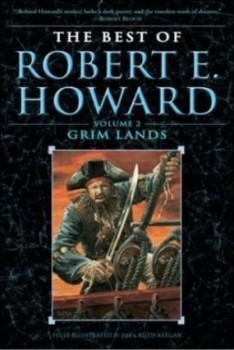 If you’re new to Howard, where can you find him? I suggest either volume of Del Rey’s Best of Robert E. Howard books, Crimson Shadows or Grim Lands. Try four or five stories out of there and see if you don’t notice what so many of the rest of us have seen. If you don’t, well, we all have different likes and dislikes. I won’t hold it against you.
If you’re new to Howard, where can you find him? I suggest either volume of Del Rey’s Best of Robert E. Howard books, Crimson Shadows or Grim Lands. Try four or five stories out of there and see if you don’t notice what so many of the rest of us have seen. If you don’t, well, we all have different likes and dislikes. I won’t hold it against you.
But if you DO see something you like, read on, because there’s more. A lot more. Those best of volumes aren’t like greatest hits collections of bands that had one good track per disc. That’s just a choice sampling, for there wasn’t nearly enough room in those best of volumes to get all the good stuff. No, if you like what you find when you stumble into the worlds of Robert E. Howard, you’ll have plenty to read for a long while, and much to revisit.
Not a year goes by that I don’t reread at least a handful of his yarns, reveling in a narrative power that still sweeps me up so fully that I stop noticing the words and fall between them, into the story.
In truth, I cannot single out the best thing or even the three best things in Robert E. Howard’s writing, but I name him one of my three favorite writers. Here’s to you, Bob. Today we celebrate the gifts you’ve left us. I wish that I might have thanked you in person for them. Since I cannot, I cherish your stories, and raise a toast to you in appreciation.
Reprinted from Black Gate online Jan 22, 2010
January 21, 2015
Link Day
 Today I offer a bevy of interesting links.
Today I offer a bevy of interesting links.
First, you may recall when I gushed about Star Trek Continues. Now’s your chance to jump in and lend a hand because the talented cast and crew need your help making new episodes (and possibly an engine room and planetary set if stretch goals are hit!) Stop by and check out their Kirkstarter, and if you haven’t already, watch their episodes. If you’re a fan of the original series you’ll be amazed.
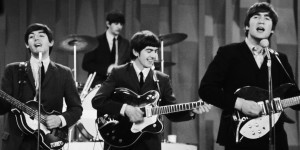 Second, the best article I’ve ever read about how exactly The Beatles came to break up. And no, it wasn’t Yoko. Visit The Rolling Stone for a thorough look at what went wrong.
Second, the best article I’ve ever read about how exactly The Beatles came to break up. And no, it wasn’t Yoko. Visit The Rolling Stone for a thorough look at what went wrong.
Third, how about an alternate universe where The Beatles got back together? Here’s a pretty nifty speculative fiction piece that supposes that The Beatles accepted that famous SNL offer to rejoin, starting with the time that John and Paul were in New York together and almost went down to the Saturday Night Live studio as a gag.
It seems like I finally figured out why FB Likes aren’t appearing on the page anymore. Unfortunately, to fix it, I have to first back up my site and then update it, so I’ll need more free time than I’ve had lately to pull that off.
Hope to see you here Friday when Bill and I will be reading two more short Lord Dunsany stories.
January 19, 2015
With The Beatles
 What strangely lovely weather we’ve been experiencing here. If I were better rested I’d be able to enjoy it even more. Hopefully I can soon get these sleep issues straightened. As it stands, I’ve little energy for normally daily activities, let alone anything extra.
What strangely lovely weather we’ve been experiencing here. If I were better rested I’d be able to enjoy it even more. Hopefully I can soon get these sleep issues straightened. As it stands, I’ve little energy for normally daily activities, let alone anything extra.
While running errands and the like over the last week I’ve been revisiting The Beatles on disc. They’re my favorite band, but it’s been several years since I listened to a sustained run of their songs. Remembering they were brilliant is one thing; listening to the songs again and soaking in that springing vitality is another. As usual, I find myself daydreaming about what it would have been like to have been a fifth Beatles and join in on the songwriting with those guys. Me and a few million other people, right?
Writing wise I’m jumping back and forth between the polishing of one book and the writing of another. Because the same characters are in both books it seems to be working pretty well. I’d be working better if I wasn’t waking up feeling tired every morning, but hopefully we can get that figured out soon.
Hope all of you out there are well. Remember, the love you take is equal to the love you make.
January 16, 2015
Lord Dunsany Re-Read: Time and the Gods Part 4
 Bill Ward and I are continuing our Lord Dunsany re-read with the next two stories published in the original Time and the Gods (not the omnibus). You can find a free copy of the book here and join in the discussion. Our rating system is pretty simple. One star is a standout, and two stars is truly notable. Most of Lord Dunsany’s fantasy work is already fairly remarkable, so even a “no star” story on this scale may be worth a look.
Bill Ward and I are continuing our Lord Dunsany re-read with the next two stories published in the original Time and the Gods (not the omnibus). You can find a free copy of the book here and join in the discussion. Our rating system is pretty simple. One star is a standout, and two stars is truly notable. Most of Lord Dunsany’s fantasy work is already fairly remarkable, so even a “no star” story on this scale may be worth a look.

Wallpaper by Peter Swigut.
Bill: Both of this week’s stories are united in the character of Khanazar the King, and both concern his grappling with some pretty weighty aspects of the human condition. I give both stories two stars, though feel “The Cave of Kai” to be the better of the two. In “The Cave,” the King pines for his vanished yesterdays, wondering “Where lie the days that were and certain hours?” He journeys to the cave where such things are kept, but cannot bribe the guardian, cannot even appeal to Kai’s sense of mercy for the return of one second of the past.
But in the strings of a bard’s harp the King does recover some of his yesterdays, and the harper is set up as a sentinel before the Cave of Kai, there to intercept any of those fleeing moments of the King, and preserve them from being lost for all time. The King dies in battle, his deeds surviving in glory thanks to the strings of the bard’s harp.
“Cave,” is a brilliant metaphorical rumination on time and loss; the longing for just one taste of a past that can never be recovered, the desire to have something live on after us. It is through the power of music and story that both things can be achieved.

Lord Dunsany
Howard: I have to agree with Bill and likewise award two stars to each. I think both are excellent but there’s something more emotive to the power of the first and its pervading sense of loss. The other is intellectually as powerful but doesn’t pull at the heartstrings quite as strongly. The concept of the harper who stands guard against the swallowing of events is brilliant, and I love all the metaphors and similes employed around and about the idea.
This may be the third or fourth time I’ve read “The Cave of Kai” and I noticed that sorcerers of seventh degree and lower are mentioned. I wonder if anyone else had ever used such terms? The first time I’d remember magic users of different levels being mentioned was in Fritz Leibers “The Lords of Quarmall” (the only story that retains any of Fafhrd and the Mouser’s co-creator, Harry Otto Fischer’s prose). I wonder if he were inspired by this tale, or if he came up on it separately? I can suppose that it was Lieber more than Dunsany that influenced D&D.
Bill: In “The Sorrow of Search” Khanazar asks a great prophet for the highest truths of existence, the real nature of the gods and of reality. The heart of the story describes the quest of the prophet Shaun, a man whose piety lets him actually see the gods. He worships the four Old gods until he notices three others on a distant mountain, and he departs with followers to set up temples to these new, and presumably, greater gods. The cycle continues with Shaun noticing two gods further off, then one. Dunsany very cleverly plays with audience expectations to make his point here, as the progression of fewer deities until arriving at ‘one true god’ surely fits the logic of most westerners, religious or otherwise. But at the last moment the prophet notices four even greater gods in the distance…and dies learning that they are the same Old gods he had worshiped at the start.
“It is well the sorrow of search cometh only to the wise, for the wise are very few,” says the prophet at the end of his tale, and I suspect this story more than any other thus far illuminates Dunsany’s own thoughts on religion. The coming full-circle nature of the prophets quest has to be seen as a kind of futility, though not necessarily an ignoble one. His “wisdom” seems more to do with his own personality and drive than it does with any actual higher knowledge, received or otherwise. In the tale preceding Shaun’s we are treated to a helpless, mewling, tiny god baffled at the ultimate unknowable, the End of all things. Shaun spends his entire life in the quest for knowledge, and that knowledge always slips just a bit further away on the horizon, it shifts with each new change in Shaun’s perspective. The parable goes beyond religion to encompass all of human knowledge: the quest for a perfect understanding will only see the finish line move further away with each step.
The story concludes with the King asking the prophet just who the true gods were, to which the prophet replies: “Let the King command.” He may have just as well said “that is for you to decide,” and I think, ultimately, that is what Dunsany is saying about the nature of the ultimate knowledge of our existence in this story.
Howard: I’m not sure what to add that Bill hasn’t already pointed out except that this is great stuff! These are tiny little gems of brilliance, fantasy ornaments that ought to be on display for all readers.
January 14, 2015
January 12, 2015
Re-Learning Mistakes
 So far I think I’m doing a great job with my New Year’s resolutions, but I’ve let one of my habits slip, which is to review my Writing Mistakes every day before I write. And you know the mistake I’ve found myself making over and over on this new one? NOT knowing what my characters want before I start writing the scene. Even if it says what they’re going to do in the outline, I have to be the director and tell those people what they want!
So far I think I’m doing a great job with my New Year’s resolutions, but I’ve let one of my habits slip, which is to review my Writing Mistakes every day before I write. And you know the mistake I’ve found myself making over and over on this new one? NOT knowing what my characters want before I start writing the scene. Even if it says what they’re going to do in the outline, I have to be the director and tell those people what they want!
Prep time does not begin and end with the outline, Howard!
On the other hand, I finally have a good openings sentence to the book, so that’s pretty nice. A lot of times I don’t have the opening sentence until much later in my outline.
So, what do I have to do that involves writing this year?
1. Revise For the Killing of Kings.
2. Promote For the Killing of Kings.
3. Finish the revision of Through the Gate in the Sea.
4. Promote Beyond the Pool of Stars.
5. Write first sequel to For the Killing of Kings.
6. Work on secret project with artist pal.
7. (Fingers crossed) write second (and final) sequel to For the Killing of Kings.
8. Write short game project before March.
9. Catch up on some very, very tardy reviews. I think I just need to throw in the towel and stop promising I can write reviews anymore. There’s just not time.
10. Seems like I ought to write some short stories but not really sure how I’m going to fit that in…
11. Attend some conventions during the promotional phases of both books, late in the year. Not sure which ones those are yet, except probably GenCon, it being the closest and one of my favorites.
January 9, 2015
Returning Next Week
Due to a variety of events, most recently a busted water heater, things have been a little hectic around here. As a consequence, our re-read of Lord Dunsany is on hiatus. Hope your own week went well, and hope to see you back next week.
January 5, 2015
2015 Resolutions
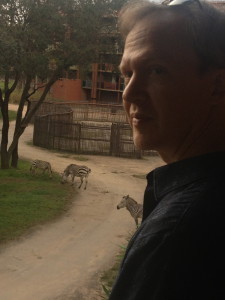 I haven’t been a New Year’s Resolution kind of guy for years. I suppose I had talked myself into thinking it was cheesy or unnecessary or something of the kind.
I haven’t been a New Year’s Resolution kind of guy for years. I suppose I had talked myself into thinking it was cheesy or unnecessary or something of the kind.
But I’ve been fighting the blues off and on for a number of months now for reasons detailed earlier, so this year I came up with a pretty simple phrase to help me remember my resolutions, one that I can repeat to myself in the mornings as I wake. (I try to remember, when I rise, to be grateful for all I have, but sometimes that’s difficult when the alarm shrieks me into consciousness to make sure the children are up and moving.)
What I tell myself is this: “I shall be kind, I shall be calm, I shall be patient.” It works more simply, too, as “kind, calm, patient.” Or as a simple (internal) question to myself: “Are you being kind, calm, and patient?”

Happy New Year! Eat cookie!
It may only be the 5th, but that’s 5 days of it working. Even when I’m feeling tired and a little grumpy I haven’t said something I regretted. And I sincerely like to be able to look back on the day and not have said something I regret.
Those of you who know me well may wonder why I, Howard, who is typically calm and kind, need this reminder. I’m still the fellow you know, I swear. But there is always room for improvement, especially when you’re suffering from the blues or lack of sleep or both.
And for whatever reason, this simple little mantra is helping. It’s keeping me focused, aiding me to get my work done with less stress, and making me kinder, calmer, and patient with those I love. And my blues are lifting. I’m not sure that last is connected, but it sure feels like it’s involved somehow.
I hope that your own New Year Resolutions are treating you well. Any of you have any you want to share with me?
Now on to some writing. Don’t I have multiple book series to complete or something? What is this, some kind of philosophy site? I’ll start talking about writing again soon, I promise. Go eat a cookie and get back to work.
January 2, 2015
Lord Dunsany Re-Read: Time and the Gods Part 3
 Bill Ward and I are continuing our Lord Dunsany re-read with the next two stories published in the original Time and the Gods (not the omnibus). You can find a free copy of the book here and join in the discussion. Our rating system is pretty simple. One star is a standout, and two stars is truly notable. Most of Lord Dunsany’s fantasy work is already fairly remarkable, so even a “no star” story on this scale may be worth a look.
Bill Ward and I are continuing our Lord Dunsany re-read with the next two stories published in the original Time and the Gods (not the omnibus). You can find a free copy of the book here and join in the discussion. Our rating system is pretty simple. One star is a standout, and two stars is truly notable. Most of Lord Dunsany’s fantasy work is already fairly remarkable, so even a “no star” story on this scale may be worth a look.
Howard: I like each of this week’s stories at least one star worth. Both dealt with the nature of gods and their worshippers. I can’t help thinking that Lord Dunsany himself was secretly an agnostic or atheist, for he has much fun with the pomp of religion, and the foolish things men worship. One of the most amusing points in “When the Gods Slept” comes when the Yozis try to convince a culture to worship them, only to be turned away because of that culture’s great faith in a mountain. The Gods of Pegana are capricious and wrathful and bored, and, as it happens, asleep.
 But then perhaps Lord Dunsany uses his stories of gods to speak to us of men. In “The King Who was Not,” he showed us a ruler so arrogant that he had images of the gods cast in his own image. And in “When the Gods Slept” we saw all manner of worshippers — some who were foolish and merely continued their practices out of habit, others who seemed more honorably to persist in what they were doing. And we were given three evil gods who finally found worshippers in baboons who they transformed into men, and they ever after worshiped madness, spite, and malice. I particularly liked this line: “And men could not discern what they were, for their bodies were bodies of men, though their souls were still the souls of beasts and their worship went to the Yozis, spirits of ill.” In the end, then, although this particular fable gives us many views of religion, it becomes a myth about how evil came to mankind, and how it happened while the gods weren’t paying attention, because they had grown bored.
But then perhaps Lord Dunsany uses his stories of gods to speak to us of men. In “The King Who was Not,” he showed us a ruler so arrogant that he had images of the gods cast in his own image. And in “When the Gods Slept” we saw all manner of worshippers — some who were foolish and merely continued their practices out of habit, others who seemed more honorably to persist in what they were doing. And we were given three evil gods who finally found worshippers in baboons who they transformed into men, and they ever after worshiped madness, spite, and malice. I particularly liked this line: “And men could not discern what they were, for their bodies were bodies of men, though their souls were still the souls of beasts and their worship went to the Yozis, spirits of ill.” In the end, then, although this particular fable gives us many views of religion, it becomes a myth about how evil came to mankind, and how it happened while the gods weren’t paying attention, because they had grown bored.
Bill: I agree that both stories deserve a star, and I share your surmise about Dunsany’s irreligion, as he does have an outsider’s perspective on the whole thing, moreso I think than, say, a devoutly Christian writer of fantastical faiths would have. And, though he writes a great deal about gods and worship, it is always more as an anthropologist or mythologist, he never seems to examine, for example, an individual’s personal faith or its integration into a society. Of course, that is par for the course with the nature of the stories he is trying to tell, and one could maybe argue that the Old Testament handles religion on this same superficial or external level of punishment and reward.
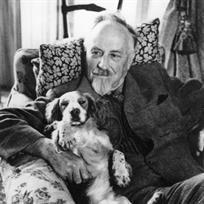 I really like that “When the Gods Slept” presents the birth of evil in the world as being the result of the gods’ own indifference and boredom. Their words of power are read by the Yozis, who then encounter many cultures that already have a religion (including those that worship the future, and the past, a nice modern insight that goes beyond merely praying to god X), finally settling on elevating beasts to the position of men in order that evil may be worshipped (and who would deny that those that do great evil in effect lower themselves to the position of beasts?). The last line, the gods awaking with a start, is wonderful — they have gotten the novel thing they longed for, but it is not at all what they intended or desired.
I really like that “When the Gods Slept” presents the birth of evil in the world as being the result of the gods’ own indifference and boredom. Their words of power are read by the Yozis, who then encounter many cultures that already have a religion (including those that worship the future, and the past, a nice modern insight that goes beyond merely praying to god X), finally settling on elevating beasts to the position of men in order that evil may be worshipped (and who would deny that those that do great evil in effect lower themselves to the position of beasts?). The last line, the gods awaking with a start, is wonderful — they have gotten the novel thing they longed for, but it is not at all what they intended or desired.
“The King That Was Not” is short and sweet, a great compact little tale that sits itself nicely within this whole unfolding mythscape. Here the gods are every bit as petty and arrogant as the man who would make them in his own image (though, of course, the King did not order the sculptors to put his face on the gods, they merely did it to please him), however there’s is the power to erase him utterly from existence, past or present. And in a very direct way this story does tell a fundamental truth about religion (at least from my and, presumably, Dunsany’s non-religious perspective) that we make it in our own image, and are best pleased when it reflects what we most want to believe about ourselves.
Howard: We’ll continue our re-read next Friday with “The Cave of Kai” and “The Sorrow of Search.” Hope to see you here!
Howard Andrew Jones's Blog
- Howard Andrew Jones's profile
- 368 followers



